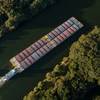High-Tech Survey of Rare Deep Coral Reefs
The Waitt Institute for Discovery and Woods Hole Oceanographic Institution have joined forces to launch the Catalyst Program, making available for the first time a versatile and highly portable deep-sea tool kit and operations team, which can be rapidly deployed anywhere in the world.
This unprecedented collaboration features the Waitt Institute's two newly built Hydroid REMUS 6000 Autonomous Underwater Vehicles (AUVs), which can explore depths of up to 6000 meters, or 3.7 miles, below the ocean's surface. These innovative multi-sensor platforms are equipped with high-tech survey instruments capable of recording critical oceanographic data, photo-imaging deep-sea features, and producing detailed sonar maps of the ocean floor.
The inaugural Catalyst expedition launches on December 4, 2008 and draws on the scientific expertise and resources of Harbor Branch Oceanographic Institute at Florida Atlantic University to explore Florida's vulnerable and rare deep coral reefs. The Catalyst One expedition will utilize the Catalyst AUVs to create the first-ever high definition side-scan sonar maps of deep- water Lophelia and Oculina coral reefs. The expedition will be led by Dr. John Reed of Harbor Branch Oceanographic Institute, who has been studying and working to protect these deep corals for over 30 years.
"These Deep Sea Coral Ecosystems are under immediate threat from destructive bottom trawling and other fisheries impacts," said Dr. Reed. "Ultimately, the Catalyst One expedition will provide us with much-needed data to help protect these fragile reefs as Marine Protected Areas and as Habitat Areas of Particular Concern."
For initial expeditions, the Harbor Branch Oceanographic Institute is also bringing its ocean exploration expertise and resources to the Catalyst program in the form of expedition logistics and science plan development. Catalyst One will also see the utilization of Harbor Branch's research vessel R/V Seward Johnson as the first Catalyst AUV launch vessel.
"AUVs are quickly proving to be the most versatile, efficient, and transformative technologies available for exploring the oceans," said Ted Waitt, founder and president of the Waitt Institute for Discovery and founder and former chairman of Gateway, Inc. "Our goal is to help implement these vehicles in a way that accelerates and advances deep-sea exploration, cutting- edge scientific research and sustainable ocean policy." As the founder of the Catalyst Program, the Waitt Institute for Discovery commissioned the construction of two REMUS 6000 AUVs and currently directs the implementation of Catalyst expeditions.
The Woods Hole Oceanographic Institution (WHOI) developed and engineered the REMUS AUVs and has assembled a rapid-response operations team with the expertise to conduct REMUS 6000 expeditions anywhere in the world. "Through the use of deep-diving AUVs and a dedicated operations team, the Catalyst Program establishes a full-time, long-lasting, high-tech knowledge center for interdisciplinary research of Earth's oceans," said WHOI President and Director Susan Avery.
(http://waittinstitute.org/wid)













